Photo by: Milleny D. Ramirez
LGBTQ+ EQUALITY
El Centro Hispano has a
vision to transform lives
January 2024
Newly hired coordinators and increased capacity for services and support came at a critical time for LGBTQ+ Latinx people. Acquired experience, loving dedication to the work, and plans for the future guide the team forward to make an even larger impact here in North Carolina.
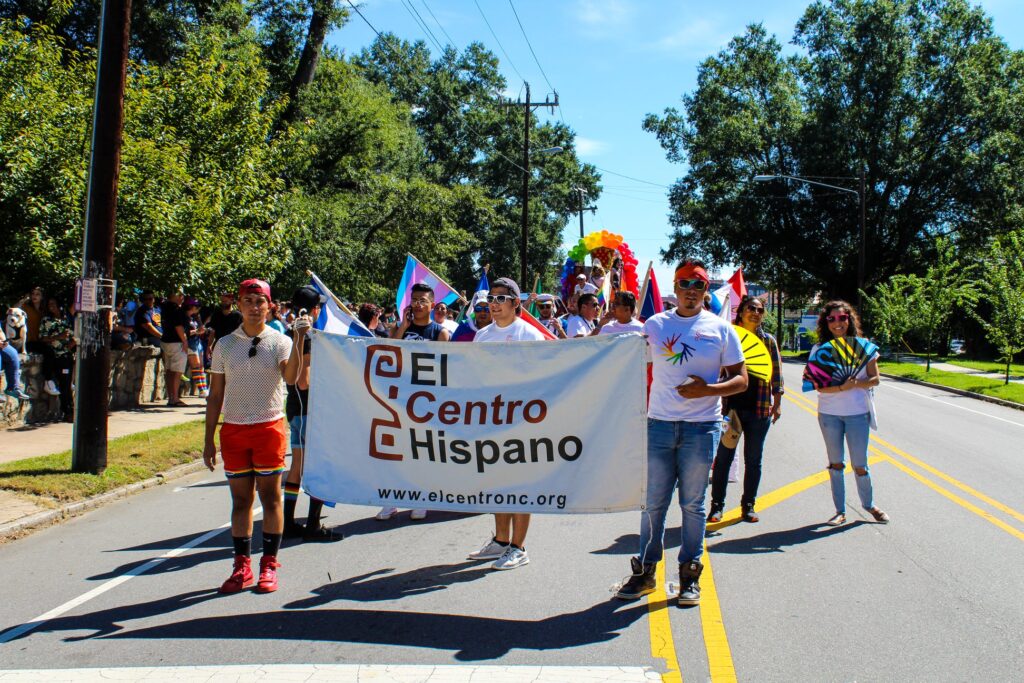
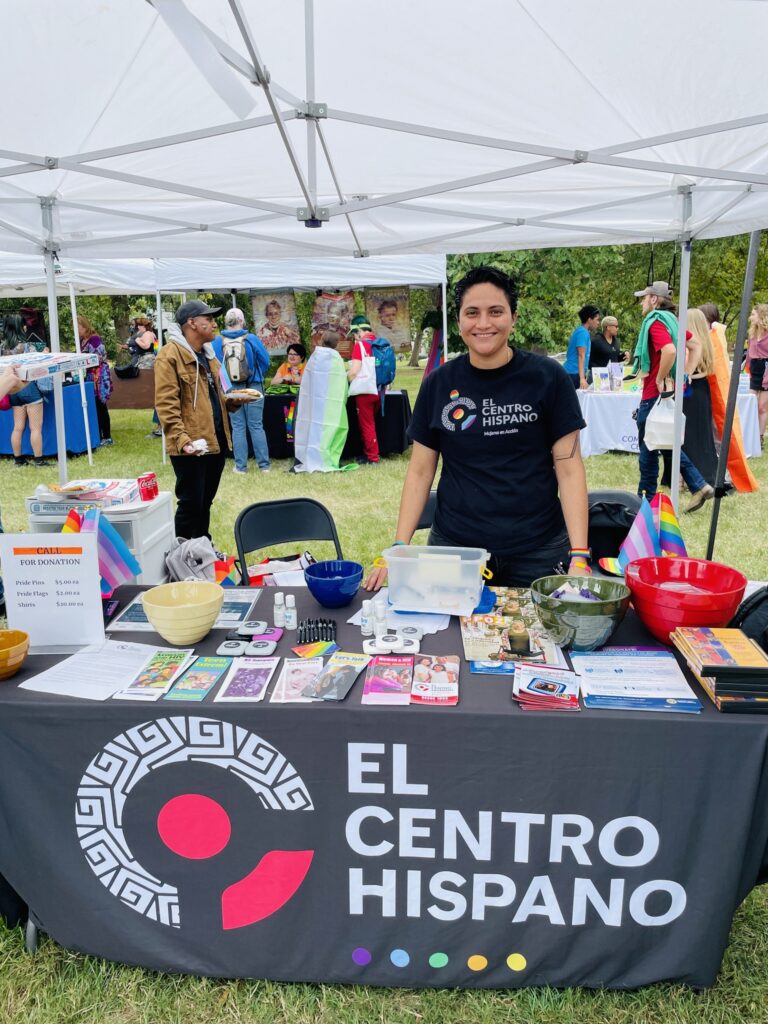
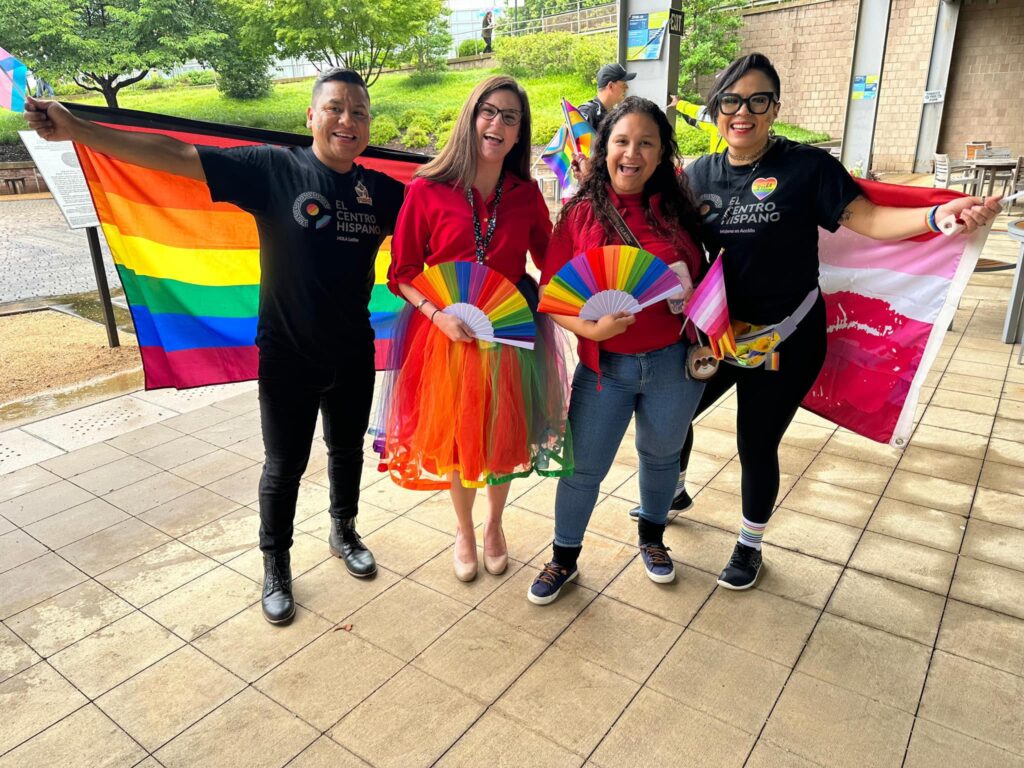
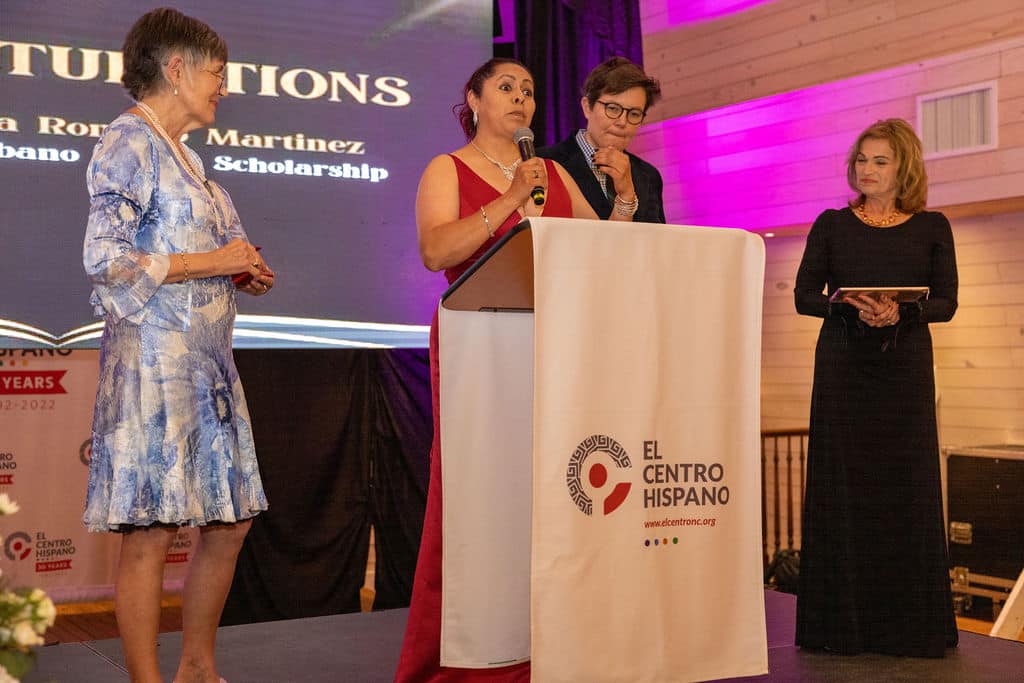
In Spring of 2014, Eliazar Posada sat outside his mother’s house in Knightdale, North Carolina, unsure of what his next steps would be. Minutes before, he had a dreaded conversation with her, telling her that he was gay.
“After I told my mother I was gay, she said, ‘I thought I had a son…’ and then, forty-seven minutes later, she told me, ‘I hope I can be proud of you someday.’” I remember how long I sat there because all I could do was stare at the radio clock in my truck,” said Posada.
Eventually, he picked up the phone and called a fellow member of Hola Latino, a group he had recently joined. Hola Latino was established as a part of El Centro Hispano’s LGBTQ+ outreach program, supporting Latinx gay and bisexual young men aged 18-29, connecting them to resources, and providing an inclusive space for members to fully be themselves.
As Posada hung up the phone, he found the courage to drive back to his university, realizing that the separation and independence from his mother had suddenly become that much more palpable. “As I drove back, I approached this curved bridge that’s pretty high and… well… I don’t know what I would have done at that bridge without that phone call.”
The South is changing, thanks to the strength and increasing organizing power of the LGBTQ+ community, and a constellation of nonprofit organizations and groups providing direct services. This is especially true of LGBTQ+ Black and Brown Southerners who are responding to urgent needs—health issues, economic insecurity, public safety and violence prevention, housing, and access to care—and transforming lives in the process. According to a recent report from the Movement Advancement Project, more than one in three LGBTQ+ people in the United States calls the South home. And almost 40 percent of LGBTQ+ people in the South are people of color. Specifically, more than one in five LGBTQ+ Southerners are Black (22 percent) and 16 percent are Latinx.
Despite some advancements through the years, still, very few places exist where LGBTQ+ Latinx people including those with limited English-language fluency and those who have recently immigrated to the US—can gather and feel safe. El Centro Hispano is among only a small number of Latinx-led organizations in North Carolina to provide spaces and services specially designed for LGBTQ+ Latinx communities.
El Centro Hispano is now home to four groups:
- Hola Latino: a support group serving gay and bisexual young men,
- Mujeres En Acción: a support group serving lesbian and bisexual women,
- Entre Nosotras: a support group serving transgender and gender-expansive
people, and - Nuestra Voz Community Advisory Board: a group that helps direct LGBTQ+
work across the Triangle.
Each group was formed through grassroots organizing over many years, with careful attention to ensure that all people in LGBTQ+ Latinx communities have spaces to address their specific needs for socialization, mental health, sexual health, advocacy, safety, and more.
In 2018, the Laughing Gull Foundation provided a general operating grant to El Centro Hispano to build and expand LGBTQ+ outreach and services. The organization decided to use the funding to hire dedicated paid coordinators for each group to make an impact on a much larger scale. Prior to receiving this grant, volunteers had organized and led each group for years with minimal resources at their disposal. Now, with dedicated resources, the groups have grown exponentially and have more than 140 actively engaged members. Having unrestricted funds gave El Centro Hispano the flexibility to act strategically, creatively, and quickly—right before the pandemic hit—so that they could build their programs in stronger, more sustainable ways.
After graduating from college, Posada was driven to invest more time and energy into El Centro Hispano. “At first, I went to outreach and volunteering events. It felt cute and fun at the time. But after coming out, I realized what a huge help this group was to me and to others. It was now not just a support group, but my chosen family. They taught me to love who I am,” Posada said.
After showing strong leadership and dedication, Posada became a coordinator for Hola Latino in 2015. After receiving the funding to hire more staff for the groups, he became the Director of Community Engagement and Advocacy. From early 2021 until summer, Posada became Acting President and CEO to support a sabbatical for Pilar Rocha-Goldberg, El Centro Hispano’s President and CEO for the past eleven years. As of January 2024, he currently serves as the Interim Executive Director of Equality NC, another LGF grantee partner. Through his years of leadership, engaging his community, and fostering love for himself, Posada also grew closer to his mother, and now they both have a strong, loving, supportive relationship.
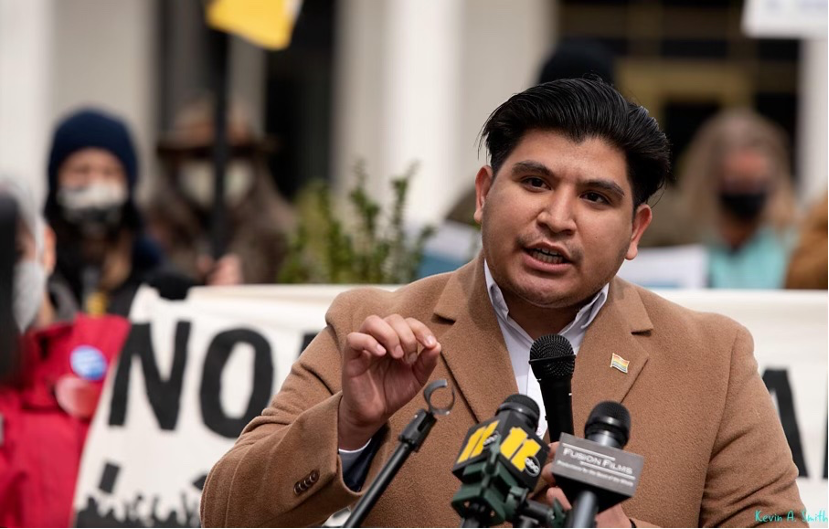
“People see all this work now, and they have to know that the local history of gathering and supporting LGBTQ+ communities is more than 20 years old. It started when people met in private on weekends. A multitude of leaders, volunteers, and advocates paved the way for us today,” Posada said. Because of such extensive experience in providing support to LGBTQ+ Latinx people, organizers and support groups from the US South look to El Centro Hispano for guidance on how to build similar initiatives in their own communities.
When disclosing their identities, many LGBTQ+ Latinx people encounter rejection from cisgender, heterosexual family members who project worry and fear onto their loved ones. El Centro Hispano’s LGBTQ+ groups witness these rifts constantly, according to Elsa Huerta, the coordinator for Mujeres En Acción. “Many of our members have family members who would constantly ask them, ‘Why do you not have a boyfriend? Why do you dress this way? Why do you want to be different?’ and I educate the parents and family members directly to remind them how their questions make their children feel.”
Huerta knows firsthand the power of strong, interconnected community support at El Centro Hispano. In 2012, she felt alone and afraid and was in search of help. Someone had mentioned El Centro Hispano to her; she then got involved and started doing volunteer work there. “This community gave me power,” Huerta said. “They told me don’t be afraid, you’re not alone.”
This community [Mujeres En Acción] gave me power. They told me don’t be afraid; you’re not alone.”
– Elsa Huerta
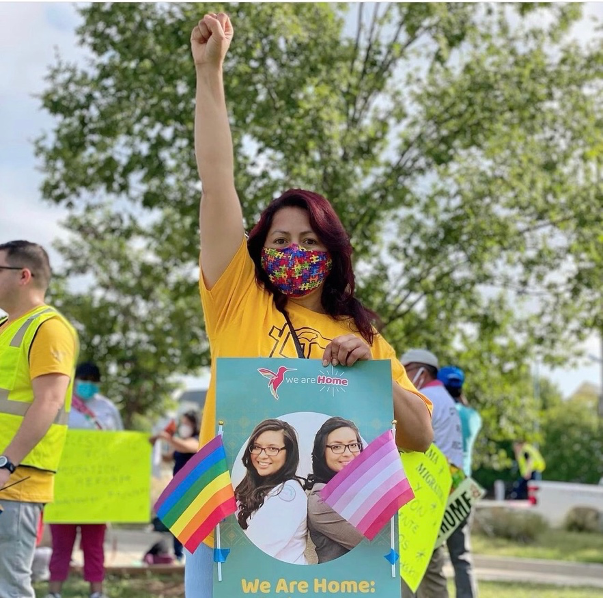
At that time, El Centro Hispano did not have a support group for lesbian and bisexual women. Recognizing her leadership, Huerta’s mentor, Alex Cordoba, proposed that she start Mujeres En Acción, a group for lesbian and bisexual women. In the beginning, the meetings were quite small and informal, gathering in the basement of a church or in coffee shops. Members would share life experiences, food, ideas, and visions for how they wanted to shape the group. In 2015, El Centro Hispano formalized Mujeres En Acción; Huerta’s leadership and drive to create this space is a testament to her desire to contribute to her community.
Huerta’s role now includes providing emotional support and connecting members to employment, educational opportunities, and mental health and immigration legal services. Any assistance that members may need, in a language they understand and feel comfortable using, helps cultivate such a space to discuss important issues.
Huerta often holds retreats for Mujeres En Acción members. “I try to set a good example for other members, especially new ones… you can be happy and find acceptance here.” Along with having fun together, she facilitates deeper group conversations on topics like relationships, racial equity, diversity, and inclusion. “I feel tired or want to cry sometimes because I cannot find the resources for [members]. So, I take a deep breath and work until I find solutions and answers for them. Seeing them happy and relieved gives me the motivation and power to keep going. I’m so grateful.”
Health and well-being are at the heart of El Centro Hispano’s support for LGBTQ+ Latinx people in North Carolina. Honoring the unique needs of each group is especially important, as people need various, tailored resources—not a one-size-fits-all response of testing and therapies.
In 2014, Roxana Picazo was looking for support as a transgender woman in need of an affirming medical provider to help her begin hormone therapy. A few friends, who are also transgender, told her about El Centro Hispano’s groups; she then began attending the monthly meetings. At the time, Entre Nosotras was just a couple of years old and was led by volunteer organizers who recognized the unique and pressing needs of transgender and gender-expressive people, especially those who primarily spoke Spanish. Between 2014 and 2018, Roxana and fellow organizers expanded their outreach and support despite having very little funding. Then in 2019, El Centro Hispano hired Picazo as the first staff coordinator of Entre Nosotras, where she now leads outreach and engagement efforts.
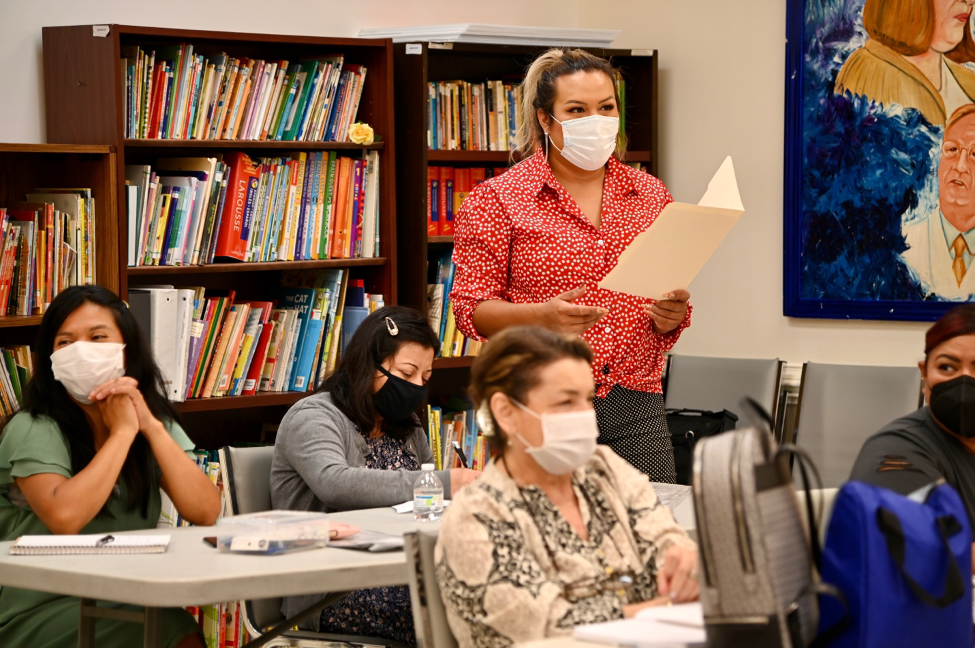
“I know what it feels like to not know where to go, to not have the funds to get what you need. I care so much about keeping my community safe. I want to be there for them,” Picazo said. She urges members of her group to take good care of themselves and help keep each other safe. There are condom tutorials, frequent reminders to start or continue taking PrEP, coaching on how to avoid underground market silicone injections, and much more. In her role, Picazo mostly connects members to affirming health care providers, mental health providers, immigration legal services, employers, and any other assistance they may need to keep themselves safe, healthy, and stable.
“I had a young woman living on my couch for a while. She was kicked out of her church and home and didn’t have anywhere to go, so she asked me for help. Another woman came here from another country and escaped violence and threats. I helped her find a reliable job and enrolled her in [ESOL] courses. But there are so many young people in transition right now,” Picazo said. “I have a dream of a big house that gives safe space to trans women and other LGBTQ+ Latinx people who need it. Maybe they just immigrated, or have to leave home, or need help after surgery. We can be there for each other. That’s what we do.”
With flexible funding and an ability to staff each of El Centro Hispano’s groups, coordinators have had more capacity to fully dedicate themselves to outreach and community response at a critical time. They have built strong relationships with medical providers, trained local businesses in how to better support LGTBQ+ Latinx people, and significantly grown their membership. The COVID-19 pandemic heightened the disparities that LGBTQ+ Latinx people face in accessing basic needs and care. Coordinators have had to work even harder during this time to expand resources and services that they can connect people to, including rent and utilities assistance, housing support, and an increased need for mental health support.
The type of specialized support that El Centro Hispano’s groups provide for Latinx LGBTQ+ adults is especially critical due to systemic oppression. They are more likely to be unemployed and experience food insecurity than non-LGBTQ+ Latinx adults. Nearly one-third (30 percent) of Latinx LGBTQ+ adults have been diagnosed with depression according to a recent report from The Williams Institute at UCLA. 81% of transgender adults in the U.S. have thought about suicide. Yet, despite this demonstrated need, funding for LGBTQ+ Latinx programs is far behind where it needs to be.
While funding for LGBTQ+ Latinx communities has gradually increased over the past few years, as of 2018, it still had not exceeded $5 million in any calendar year. The funding is dependent on a small number of funders and is even more top heavy than LGBTQ philanthropy in general, according to a report from Funders for LGBTQ Issues and Hispanics in Philanthropy. This current funding level for LGBTQ+ Latinx people, who represent 20% of all LGBTQ+ adults in the U.S, is quite low and only two percent of the more than $209 million total foundation grantmaking for LGBTQ+ communities across the United States.
While continuing to navigate this complex time, emotional and mental health is top priority for El Centro Hispano’s LGBTQ+ groups, with many in their community lacking the ability, comfort, or safety to be with family, travel to see loved ones, or freely gather as they did before 2020. The groups have created círculos de escucha/listening circles, where members can talk through their experiences, and group coordinators regularly work to identify mental health providers and therapists who can support clients unable to pay for expensive out-of-pocket services.
El Centro Hispano’s LGBTQ+ groups find themselves in a difficult and all-encompassing landscape. They have recently lost members and friends to COVID-19 and violence. They face both systemic oppression and daily microaggressions. These combined traumas take a toll in material and spiritual ways. Yet these phenomenal leaders keep pushing ahead, remaining laser-focused on their transformative vision where everyone in their communities can feel safe, healthy, loved, and cared for.

